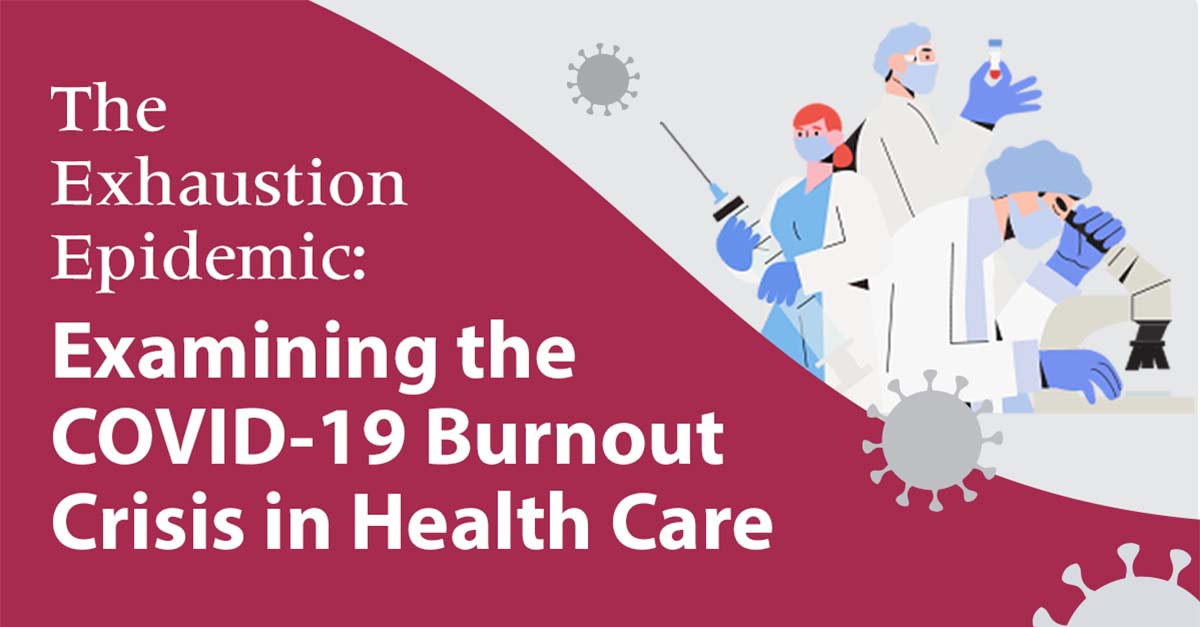You are now leaving XTANDI.com
The website you are about to visit is not owned or controlled by Astellas. Astellas are not responsible for the information or services on this site.

The article below, authored by Mark Reisenauer, president of Astellas Pharma US, is in association with the STAT News virtual event “The Exhaustion Epidemic: Examining the COVID-19 Burnout Crisis in Health Care” that was held on February 7, 2022. The event brought together industry experts to discuss the importance of addressing the burnout crisis and providing health care workers with solutions. The below article features a perspective from Mark Reisenauer on the importance of creating a culture of wellness to counter employee burnout.
By Mark Reisenauer, President, Astellas Pharma US
In February, STAT News held a virtual event, “The Exhaustion Epidemic: Examining the COVID-19 Burnout Crisis in Health Care,” that delved into how the pandemic has left healthcare workers mentally fatigued, with many leaving the industry as a result. Astellas joined a diverse group of speakers for a conversation on the emotional burden healthcare workers are facing and uncovering solutions to support and retain them.
Given the ebb and flow of this pandemic, clearly something needs to be done to protect the health of these essential workers. In the years leading up to the pandemic, burnout cost the healthcare system about $4.6 billion annually, and it’s highly doubtful that this trend has reversed itself over the last two years.1 We see an opportunity to share employment best practices with each other and across the industry that could benefit the larger healthcare ecosystem.
Astellas is committed to facilitating and strengthening the most authentic connection possible between the company, employees and patients, among others, to build a healthier and happier culture by always keeping the focus squarely on people, from those doing the work to those reaping the benefits of it.
There are many ways we strive to provide an opportunity for our employees to share regular feedback. It’s important that we continue to evolve those methods as our environment continues to change. This month, as part of our regular employee engagement survey, we’re offering employees access to results faster than ever before. We’re increasing ownership by engaging employees at all levels in helping solve our biggest challenges. To maintain a healthy culture, there is always more work to do. And, by listening to employees and keeping the focus on the areas that still need improvement, I believe we’ll be in a better position to support the wellness of all employees.
For many years, Astellas has prioritized these types of efforts to help our culture thrive – from creating channels for employees to share their personal and professional stories in an inspiring and motivating way, to establishing forums where employees can work together to innovate and solve our biggest business challenges. In 2021, we began offering “ask me anything” sessions with senior leaders to encourage greater connectivity with senior management. We incorporated a training program for managers and employees on how to best work in a new hybrid/remote environment. We added a floating “Heritage Day” that employees can take at their discretion in observance of a date that has personal importance to them. And we continue to develop new approaches to help remote employees understand, connect, and contribute to our business strategies.
We also support seven dynamic Employee Impact Groups (EIGs) focused on empowering employees to establish inclusive support communities within the organization. Our EIGs create forums for employees to explore and share issues that may uniquely impact their personal wellness. This year, our Abilities EIG launched our Employee Cancer Support Community, creating a first-of-its-kind forum for employees to share support and resources.
And, in this especially difficult time, Astellas has ramped up its efforts to support the mental and emotional health of its employees (and their dependents) to provide them with access to specialized physicians, mental health professionals and programs to help bring meaningful change to their lives.
While these approaches my not address all the extreme challenges that patient-facing doctors and nurses, particularly in hospital or urgent care settings, are currently facing, they may provide a roadmap for healthcare workers to improve the quality of their work experience and help counter burnout and mental health concerns. Keys to achieving success is ensuring transparency every step of way, coupled with frequent two-way communication. Effecting change requires more than just pushing out information. It’s about creating dialogue that makes the employees part of the process – and the solution – that can lead to positive change.
References
 |
Get only the email alerts you want.
For media inquiries and reporter requests, please email us at corporate.communications@us.astellas.com.
Our communications team will respond to verified media requests within 24-48 hours as appropriate.
If you are not a reporter and need assistance, please visit our contact us page that includes information for patients, healthcare providers and researchers.
This website is intended for U.S. residents only. This website contains information about products that may not be available in all countries, or may be available under different trademarks, for different indications, or in different dosages. Nothing contained herein should be considered a solicitation, promotion or advertisement for any drug including those under development. Any information on the products contained herein is not intended to provide medical advice nor should be used as a substitute for the advice provided by your physician or other healthcare provider.
The site uses cookies to provide you with a more responsive and personalized service and to analyze site traffic. By using this site, you accept our use of cookies as described in our privacy policy. Please read our privacy policy for more information on the cookies we use, the processing of your personal data and how to delete or block the use of cookies.